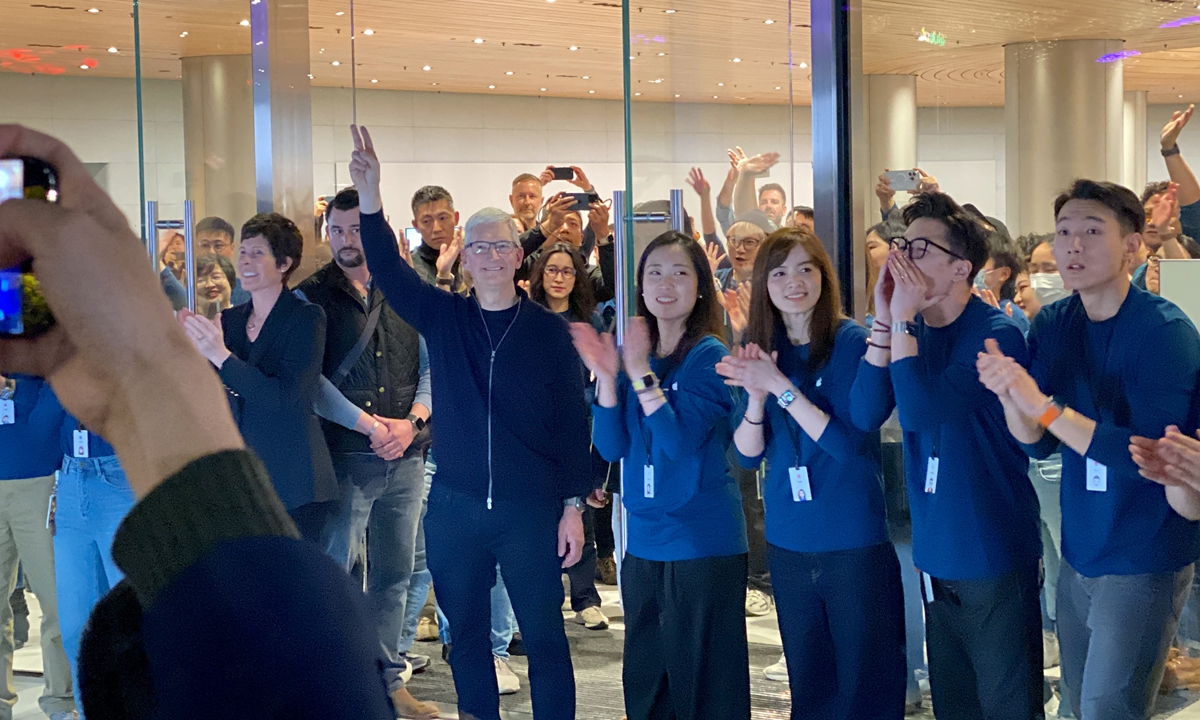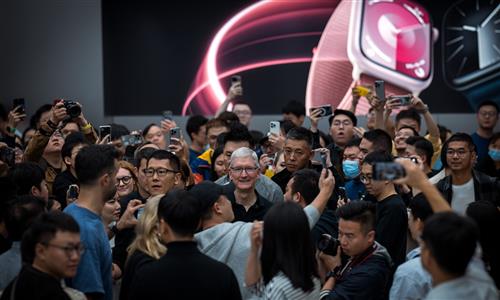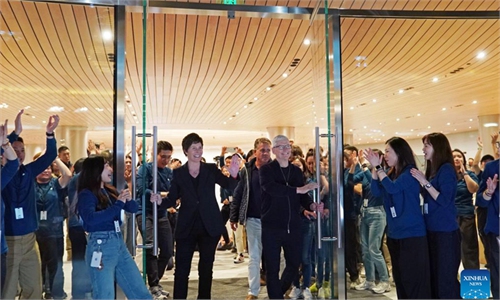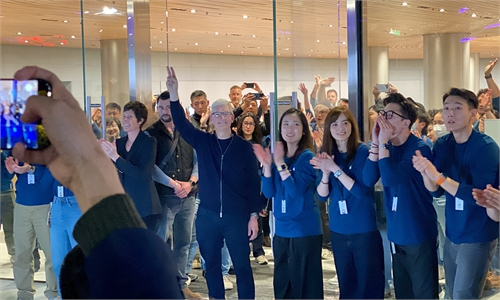Cook's trip again reflects temperature difference between business environment in China, US: Global Times editorial

Apple CEO Tim Cook waves to crowds as he attends the opening ceremony of a new flagship store in Shanghai on March 21, 2024. It is the second-largest Apple flagship store after the one on Fifth Avenue in New York City. Cook also took pictures with customers on site and signed autographs. Photo: Chen Xia/GT
Apple CEO Tim Cook's latest trip to China, like his many previous trips to the country, has again trended on social media platforms. From attending the opening ceremony of a new retail store in Jing'ansi Square, Shanghai, to hosting an information-sharing session with Apple's suppliers, including Chinese electric vehicle maker BYD, Cook was warmly welcomed, in strong contrast to the very different treatment some Chinese companies face in the US. Another important part of Cook's trip is to participate in the upcoming China Development Forum's annual meeting, which will take place from Sunday to Monday. In addition to Cook, the event is expected to draw more than 110 foreign guests, including representatives of international organizations, corporate executives and well-known scholars. Although they may not share the same level of popularity, the red carpet the Chinese side rolls out to welcome them will be the same.This is Cook's third visit to China in one year. According to some statistics, Cook has visited China more than 20 times since 1996, making him one of the most frequent visitors to China among multinational executives. Some analysts believe that Cook and executives of other foreign high-tech companies flocking to China is a sign of just how much regard the US high-tech industry has for China's whole supply chain and vast market, especially against the backdrop of increasing geopolitical risk in the world. This is also recognized by Cook. "For Apple's supply chain, I think there is no place more important than China," he said on Wednesday while promising to invest more in China.
Cook appeared in China at a time when Apple's iPhone sales plunged in the country, making some overseas media depict Cook's ongoing trip as a "charm offensive." But they cannot deny the truth of what Cook said on Wednesday, because it is in line with the facts. In the past few years, a considerable part of Washington's push for "decoupling with China" has put pressure on Apple. On the one hand, this is because Apple is a top high-tech company in the world by market capitalization, and if such a company leaves China, it will result in considerable public discussion. On the other hand, Apple is more than just iPhones. Since the company itself does not produce hardware, it is backed by a huge industrial chain. If Apple can be successfully "poached" from China, some US politicians think this will greatly hinder China's momentum in catching up with the US. To this end, they have made great efforts.
For some time now, there have been rumors that Apple is "moving its industrial chain out of China." A Japanese research company disassembled the latest iPhone 15 Pro Max and found out that the parts and components provided by manufacturers from the Chinese mainland accounted for only 2 percent of the cost. Every bit of the fall of Apple's sales in China has triggered hype that wants to create an impression that Apple is "not popular" in China and that China's business environment "lacks stability," attempting to create a deterrent effect on other foreign enterprises. Cook's current trip to China is also in their sniping range.
In his recent remarks in China, Cook mentioned that 30 years ago, factories in China were not highly automated. However, now China's factories have achieved a high level of modernization, with very advanced manufacturing capabilities and well-trained workers. As an observer, he can see clearly that Chinese manufacturing is no longer just about processing and assembly; it is increasingly moving toward upstream design and research and development, which is precisely the area where the value-added modern manufacturing is most concentrated. For example, components from Chinese mainland manufacturers account for 60 percent of the latest Apple Vision Pro headset. It can be said that the relationship between Apple and China's supply chain is mutually beneficial.
Actually, this is not just Apple's choice. Even Nvidia, which has been highly sought after in the market due to the AI boom, has a clear understanding of this. Nvidia CEO Jensen Huang recently stated in an interview, "Many components of our chips are produced in China, which is consistent with the complexity of the global automotive supply chain. It is difficult to break the globalization of the supply chain." Regardless of how external opinions may criticize it, the strength of the Chinese market and supply chain is evident, and more importantly, China's commitment to opening-up to the world has always been consistent.
Cook arrived in China on March 20, Beijing time. In just a few days, Washington has once again stirred up numerous issues. A bipartisan group of US lawmakers demanded higher tariffs on Chinese-made drones, while some lawmakers expressed "concerns" about Microsoft's Bing search engine operations in China. Officials from the US Department of Commerce claimed that Chinese chipmaker SMIC "may have violated the law," and there were rumors that the Biden administration is considering sanctions on Huawei's chip network. Even with such harsh crackdowns by the US government on Chinese high-tech companies, Cook and Apple have not been treated unfairly in China. This contrast begs two questions: "Which one is the free and open market?" and "Which country is more open to foreign enterprises?"
China is vast, and the Pacific Ocean is wide enough. There is ample space to support the mutual development of China and the US. Intentionally portraying the space as narrow is not well-received. Both Cook and Apple have established a sustainable and positive interactive relationship with China, which is quite representative. Globally, China's market is widely recognized for its commitment to openness and the efforts made to create a business environment that adheres to principles such as fair competition. In fact, for these multinational enterprises, these are precisely the factors they consider when choosing a market.



